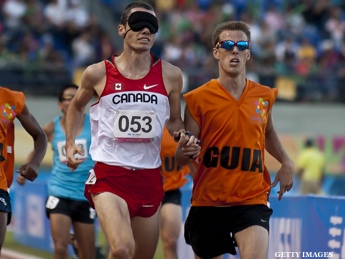Olympic-caliber athletes are known to be extremely meticulous when it comes to their bodies. And for good reason. These athletes have spent years upon years crafting their physique, and even the slightest change could drastically alter their careers.

So when Jason Dunkerley, a five-time Paralympic medalist from Canada, decided to donate his kidney to his wife, he had no illusions about the risk he was taking.
“I tell you, you can’t put it into words (what Jason is about to do)," Dunkerley's wife, Colleen Hayes, told the Ottawa Citizen. "He was willing to be tested for being a possible match and put so much on the line. He's putting his running races aside and his own health. Doctors have told us any time you have surgery there are risks going in (such as bleeding and infection)."
Dunkerley is a blind distance runner who has medaled in the past four Paralympic Games. Hayes, who is also blind, discovered she had a kidney disease during the 2008 Beijing Paralympics. Martin Cleary of the Ottawa Citizen writes that at that point, Hayes' kidneys were functioning at 25 percent. And they continued at that rate for four years.
Then, in October 2012, Hayes' creatine levels jumped, and she was forced to start dialysis three times a week. Doctors determined that a kidney transplant would be the only way Hayes would be fully healthy.
Normally, kidney transplants must come from relatives. It's quite unlikely that a non-family member can provide a kidney. After submitting himself to multiple tests, Dunkerley discovered that his kidney was more than likely a match.

"I feel lucky to be in a position to be able to donate," Dunkerley said. "Being married to Colleen, I feel lucky she didn’t have to look too far (for a donor). It feels very right. We're definitely not a perfect (medical) match, but it’s close enough. Technology has come a long way and they feel it will be a success.”
There is no date for the surgery yet, but Dunkerley and Hayes expect it to be sometime in late February or early March. After the surgery Dunkerley has been advised to stop running for a period of around six weeks while his body recovers. After that he's hoping to resume normal activities and begin training for the world championships and, eventually, the 2016 Rio Paralympics.
"As hyper-focused and anal as I get about running, something like this makes you realize that it isn’t everything," Dunkerley wrote in a blog post, "that life and health and being there for your loved ones matters far more."
For Dunkerley's full story, see here.




